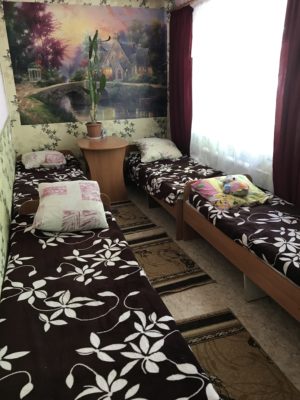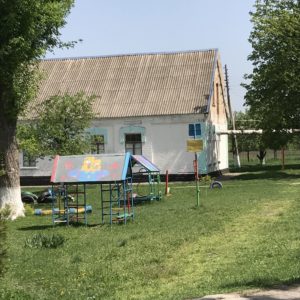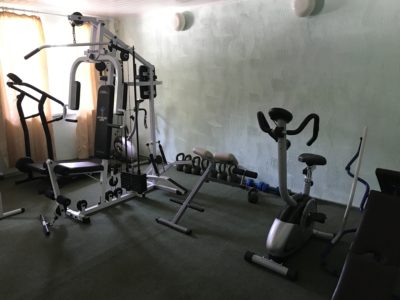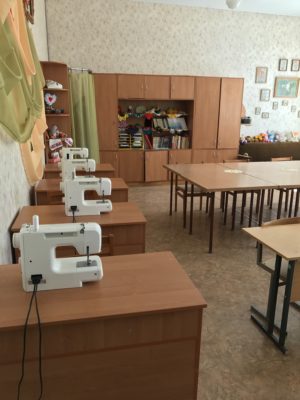 While I was in Ukraine earlier this year, we traveled to a smaller town east of the capital city to visit a Ukrainian orphanage, and the children who live there. To get to Zaporizhya from Kyiv, you must head southeast on the fast train. Although we are leaving very early in the morning, the concrete stairways leading down to the boarding tracks are packed with people of all ages as travelers hustle to get to the train before it departs. Trains are always on time in Ukraine.
While I was in Ukraine earlier this year, we traveled to a smaller town east of the capital city to visit a Ukrainian orphanage, and the children who live there. To get to Zaporizhya from Kyiv, you must head southeast on the fast train. Although we are leaving very early in the morning, the concrete stairways leading down to the boarding tracks are packed with people of all ages as travelers hustle to get to the train before it departs. Trains are always on time in Ukraine.
The train is comfortable, clean and our “home” for the next 7-8 hours. Sitting beside the window, we watch intently as the urban landscape of Kyiv turns to countryside with small white cinderblock houses trimmed in bright blues and greens and roaming chickens pecking anxiously on the ground. Life is probably very hard here, especially in the harsh winters. But today, in April, it is unusually warm outside and tulips, daffodils, dogwoods, and hyacinths bloom colorfully. I watch as men and women, mainly in their declining years, maneuver spades and hoes to plant potatoes and other root vegetables on their tiny farms. Cows and goats are latched to long chains in the yards of the farmhouses and they sometimes get dangerously close to the train tracks. A small village appears on the horizon and I can see people either purposefully walking or riding bikes. Older women clad in kerchiefs on their heads either sit outside or walk the dirt-worn paths alongside the trains; this is my archetypal picture of Eastern European history. In other flashes of the countryside, I also see abandoned shells of old Soviet bloc housing or shuttered manufacturing plants. It looks ominous and foreboding today; I wonder what tales it could tell about its tumultuous past. Finally, we depart the train in Zaporizhya.
 From the larger city of Zaporizhya, where the inviting Dnipro River beaches attract townspeople on holiday and Lenin Avenue (the Prospekt) boasts itself as the longest promenade in Europe, we head deeper into the rural region of Zaporizhka towards the orphanage. This region is rich in agriculture, a leader in Ukrainian sunflower production and an industrial giant. From here, we travel for about two hours in a van with a hired driver. Finally, we arrive at the expansive property of the orphanage.
From the larger city of Zaporizhya, where the inviting Dnipro River beaches attract townspeople on holiday and Lenin Avenue (the Prospekt) boasts itself as the longest promenade in Europe, we head deeper into the rural region of Zaporizhka towards the orphanage. This region is rich in agriculture, a leader in Ukrainian sunflower production and an industrial giant. From here, we travel for about two hours in a van with a hired driver. Finally, we arrive at the expansive property of the orphanage.
Multiple aged buildings, play spaces and groups of children come into view. Teenagers, mainly boys, quickly crowd around our van to see who is here. They are both curious and hopeful. Several of the boys beg, “Take me to America.” We smile and greet them warmly, but know in our hearts that their desires are not going to be possible.
We head inside the thin wooden double doors of the main building. The wide hallways are decorated with dated wallpapers and tiles; overall, it is quiet. The facility appears to be adequate and clean for housing a large number of older orphans. The staff are very nice and the Director pleasant.
We go inside his plain small office to discuss our adoption agency, our rich history with Ukrainian adoptions and our blossoming hosting program. He listens intently and asks good questions. He is proud of his facility which currently houses 268 children. However, only 60 children are actually available for adoption at the moment. Some are waiting for finalization with chosen international families while others are housed here despite having parents living locally. Their parents cannot afford to parent and feed them full time due to the economic downturn, so they visit occasionally or go home on weekends. All of the children living here are ages 6 and older. They offer a Boarding School for them and staff live on site or in the local village. The Director’s wife is one of the teachers and she anxiously asks about previously adopted children and how they are adjusting to their new families in the US. The children we see attending class appear to be paying attention and studying as we pass by the many classrooms. In other areas of the compound, younger children run excitedly to greet the staff and receive hugs from them. You can see affection demonstrated and evidence of established relationships between them, something you always question when visiting an orphanage.
 Soon we go to one of the child friendly rooms to speak with 11 children who are available for hosting. The sibling groups instinctively sit together, holding hands, hugging each other, and teasing one another. Our MLJ Ukrainian staff member, Viktor, translates and our discussion begins. A thin 13-year-old blond-haired boy who has recently arrived alone at the facility from Soviet occupied Donetsk patiently awaits his turn for questions. I watch mesmerized as he puts forth his “best self” hoping to be chosen for hosting. Sadly, we are told the paperwork needed to clear him for adoption may never arrive as Soviet occupation of the region has reportedly “lost” many children’s histories and permissions. Most of the children are reserved at first but soon they are enthusiastically demonstrating their athletic skills or gymnastic tricks and laughing loudly with us. The girls want to touch our jewelry or hold our hands. Touch is so powerful and smiles easily transcend any language barriers!
Soon we go to one of the child friendly rooms to speak with 11 children who are available for hosting. The sibling groups instinctively sit together, holding hands, hugging each other, and teasing one another. Our MLJ Ukrainian staff member, Viktor, translates and our discussion begins. A thin 13-year-old blond-haired boy who has recently arrived alone at the facility from Soviet occupied Donetsk patiently awaits his turn for questions. I watch mesmerized as he puts forth his “best self” hoping to be chosen for hosting. Sadly, we are told the paperwork needed to clear him for adoption may never arrive as Soviet occupation of the region has reportedly “lost” many children’s histories and permissions. Most of the children are reserved at first but soon they are enthusiastically demonstrating their athletic skills or gymnastic tricks and laughing loudly with us. The girls want to touch our jewelry or hold our hands. Touch is so powerful and smiles easily transcend any language barriers!
We toured one of the dorms which housed bedrooms ranging in size for larger groups of 12 children to only 2. The rooms were relatively stark, but orderly and containing a few personal belongings. Shoes were lined up outside the entries. The staff were proud to show us the remodeled girls’ bathroom. Recreation areas inside the buildings included a TV and computer room, arts and crafts room, sewing room, dance area, bodybuilding/exercise area, swimming pool, ping pong table, and small climbing wall. Outdoors, there were several playgrounds, a soccer field, a few bicycles, and even a battered older dog who also appeared to be an orphanage “resident.” Groups of older girls sat together outside on benches chatting, braiding hair and playing hand games as they whiled away endless hours of time. The extensive property also had a lake where they reportedly often bar-b-cue and fields of sunflowers where the oil is harvested to help support the orphanage. The play equipment both inside and out has all been lovingly used by children over the years; these children are not used to the finer things. Although the clothing the children are wearing can be described as “American”, it is often mismatched or unknowingly inappropriate. One young girl wore a black Jack Daniels t-shirt having no knowledge of what it represented.
 We also met with several identified children who were in the adoption process with our agency and we delivered gifts to them from their parents-to-be. Smiles and joyful expressions ensued as they opened their packages and talked happily about coming home to America. One little boy shouted, “I knew they wouldn’t forget!” (translated) as he opened a particular gift. The happiness of these few children who knew they were wanted by families contrasted sharply with the anticipation and hopelessness of the children still waiting. It was a stark reminder of the need for loving homes for these children!
We also met with several identified children who were in the adoption process with our agency and we delivered gifts to them from their parents-to-be. Smiles and joyful expressions ensued as they opened their packages and talked happily about coming home to America. One little boy shouted, “I knew they wouldn’t forget!” (translated) as he opened a particular gift. The happiness of these few children who knew they were wanted by families contrasted sharply with the anticipation and hopelessness of the children still waiting. It was a stark reminder of the need for loving homes for these children!
Next, we were escorted to the large food service hall where we saw endless tables set up for lunch with plates, bowls, utensils, and bread baskets. In the warm kitchen, staff stirred steaming pots of soup and sizzling pans of vegetables and meat. Through a small hallway, we entered a private dining room where the Director generously offered us lunch- a delicious soup, beef, mashed potatoes, cabbage, bread, and juice. It was all quite good!
Prior to departing, we unloaded our gifts for the orphanage children with the help of several teen boys supplying their muscle. Crates of fresh fruits and bags of Ukrainian candies, both rare commodities in an orphanage, were taken to the kitchen. The children clamored to see what was being given to them and squealed in delight at the sight of the various candies. It takes so little for these children to feel some joy in their lives; a simple piece of candy or fruit does that.
Soon we got back into our van. A line of children waved longingly to us as we left the orphanage property knowing that yet another vehicle of Americans was departing without them. Tired from the long day and filled with so much emotion, we rode quietly back to Zaporizhya hoping, and praying, that our quest for adoptive families for these children would come to fruition.
